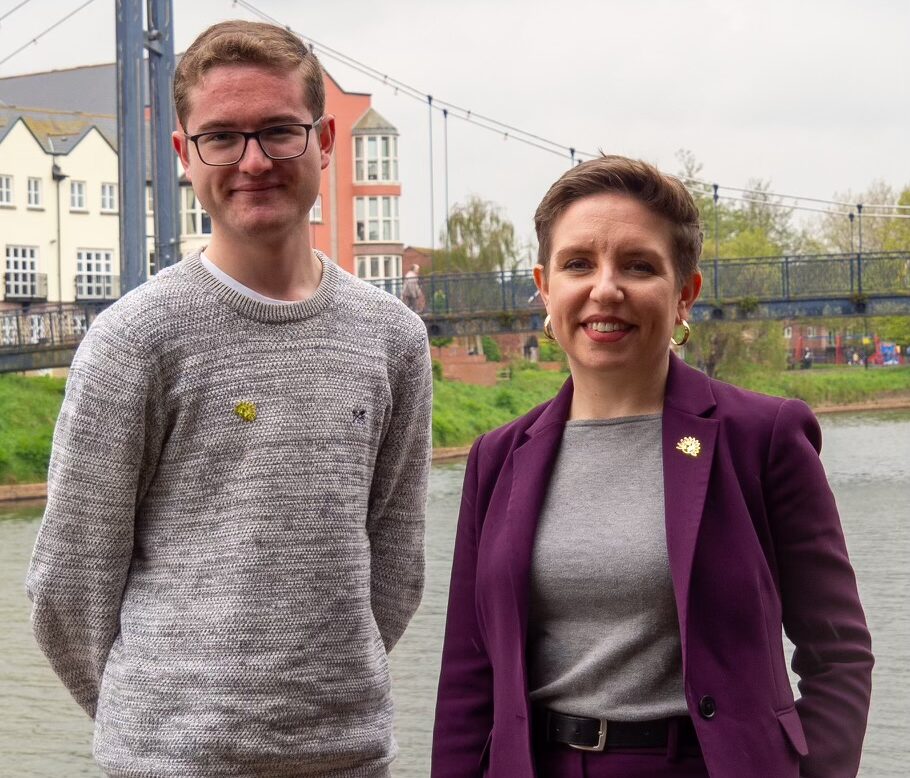
When Thomas Richardson arrived at the University of Exeter, he found a dormant Green Party Society—a surprising absence for a campus grappling with questions of sustainability and political representation. Thomas, now a third-year International Relations student, took on the challenge of reviving the Green Party Society at the University of Exeter in the autumn of 2022. Motivated by his dissatisfaction with the direction of Labour, he identified a need for greater political representation on campus.
Thomas, the current Chair of The Green Party Society, attributes his leadership style to experiences before university. “In Sixth Form, I started a Model UN program, so I wanted to continue creating opportunities for others.” His passion for politics has extended beyond the campus, as he also became involved with the local Green Party, eventually being elected as the Young Greens Officer, as well as having plans of running as a Green Party Councilor in Devon County Council in 2025.
This dual commitment—to campus and community—shaped his perspective on activism and democracy. “One of my responsibilities has been increasing young people’s political participation,” he notes. “Voter apathy, especially among students, is a real concern. Many feel disconnected, particularly after Brexit and years of political disillusionment.”
The Surge in Green Party Support: A Turning Point in UK Politics?
The Green Party’s performance in the July 2024 elections marked a watershed moment in UK politics, as the party secured four parliamentary seats, its most significant electoral achievement to date. For Thomas Richardson, this success reflects a combination of strategic campaigning, public discontent with the status quo, and a shift in political priorities among voters. “The election was a validation of everything the party has worked for over the years,” Thomas shares.
The party’s approach to resource allocation was critical. People who do not know the Green Party are a little confused about the ‘randomness’ of the MP seats. “We have to work within the limitations of the first-past-the-post system,” Thomas explains. “That means identifying constituencies where we have the best chance and focusing our efforts there.”
This strategy paid off in constituencies like Waveney Valley and North Herefordshire, where locally popular candidates with strong ties to their communities resonated with voters. “In Waveney Valley, Adrian ran on conserving the environment, which aligned perfectly with the values of a traditionally small-c conservative area. It’s about meeting people where they are and addressing their specific concerns,” Thomas notes.
Such success is not merely anecdotal but part of a larger trend. “In Exeter, where we now have seven councilors, we’ve demonstrated that the Greens work hard for their communities. Voters want representatives who are reliable and proactive, and that’s something we’ve proven time and again.”
Thomas attributes part of the Green Party’s rise to broader political dissatisfaction. “We’ve grown up in a time of Brexit, Conservative dominance, and constant broken promises. For young people, this has been a disillusioning experience,” he explains.
Labour’s perceived failures on key issues like Palestine and climate policy further alienated voters. “We’re the only major UK party that recognizes Israel as an apartheid state. “For many, that stance isn’t controversial.” Thomas says. He also critiques Labour’s lack of bold climate action during the campaign. “The climate crisis is an existential threat, and it’s unacceptable for it to be sidelined. The Greens keep it on the agenda because it’s only a matter of time before the consequences become undeniable.”
The election also allowed the Greens to challenge the long-standing stereotype of being a single-issue party. “We’ve worked hard to show that we care about more than the environment,” Thomas says. “From tax reform to fixing the NHS and improving public services, we’ve built a platform that addresses the challenges people face daily.”
Key policies included progressive taxation to fund public services and restoring utilities to public ownership. “It’s about practical solutions,” Thomas emphasizes. “People want policies that make a tangible difference, and we’re offering that.”
A Case for Proportional Representation
For the Green Party, the 2024 elections highlighted the urgent need for electoral reform. “Under proportional representation, we would have secured far more seats,” Thomas argues. “The current system forces people to vote tactically, which often benefits the larger parties at the expense of smaller ones like ours.”
Thomas sees PR as a solution to voter apathy and disillusionment. “When people know their vote truly counts, they’re more likely to participate. It’s about giving everyone a fair voice in our democracy.”
Despite the momentum, Thomas acknowledges that challenges remain. “Introducing proportional representation is not without risks, such as giving a platform to fringe parties. But the current system is not true democracy,” he argues.
Looking Ahead: Goals and Aspirations for the Green Party Society
As the Green Party Society enters its next phase, the focus is on growth, collaboration, and inclusivity. Reflecting on the past year, Thomas highlights the importance of working with other student groups to build stronger connections. “This year, we’ve been successful at collaborating with societies that share our values, and we want to continue that momentum,” he explains. Looking ahead to Term 2 and beyond, the society plans to host more joint events, increase engagement with the university, and expand its reach. “There’s so much potential for higher membership,” Thomas says, emphasizing that the groundwork is in place for a larger, more active community.
For students who are curious but hesitant to join, Thomas offers reassurance. “Come to a social, meet people, and see what we’re about. You don’t have to be deeply political to join.” he says. The society has heard the call for more casual gatherings and plans to deliver, aiming to bring together students from both inside and outside the university.
Getting involved with the Green Party Society offers more than just camaraderie. For those interested in politics, the society provides opportunities to engage in campaigns, including Thomas’ own for the Devon County Council elections. But it’s not all about policy and activism. The society also runs a popular intramural football team—the largest among political societies on campus—and is exploring the idea of launching a netball team.
As Thomas prepares to pass the torch, he’s confident in the society’s ability to grow and thrive. “There’s a lot of potential for the Green Party Society to become even stronger,” he says. With a commitment to collaboration and progressive values, the Green Party Society aspires to leave a lasting impact, shaping a more connected and engaged university community in the future.
To find out more about the University of Exeter Green Party Society, please follow this link to see their page on the Exeter Student Guild Website: https://my.exeterguild.com/groups/H22JQ/green-party-society
Or check out their Instagram: https://www.instagram.com/exegreensoc/
* The Witness Journal’s Senior Editors, Veronika Parfjonova and Emily Hone, conducted interviews with all of the societies that were willing to participate as part of a feature series to showcase political party societies at the University of Exeter*


Average Rating